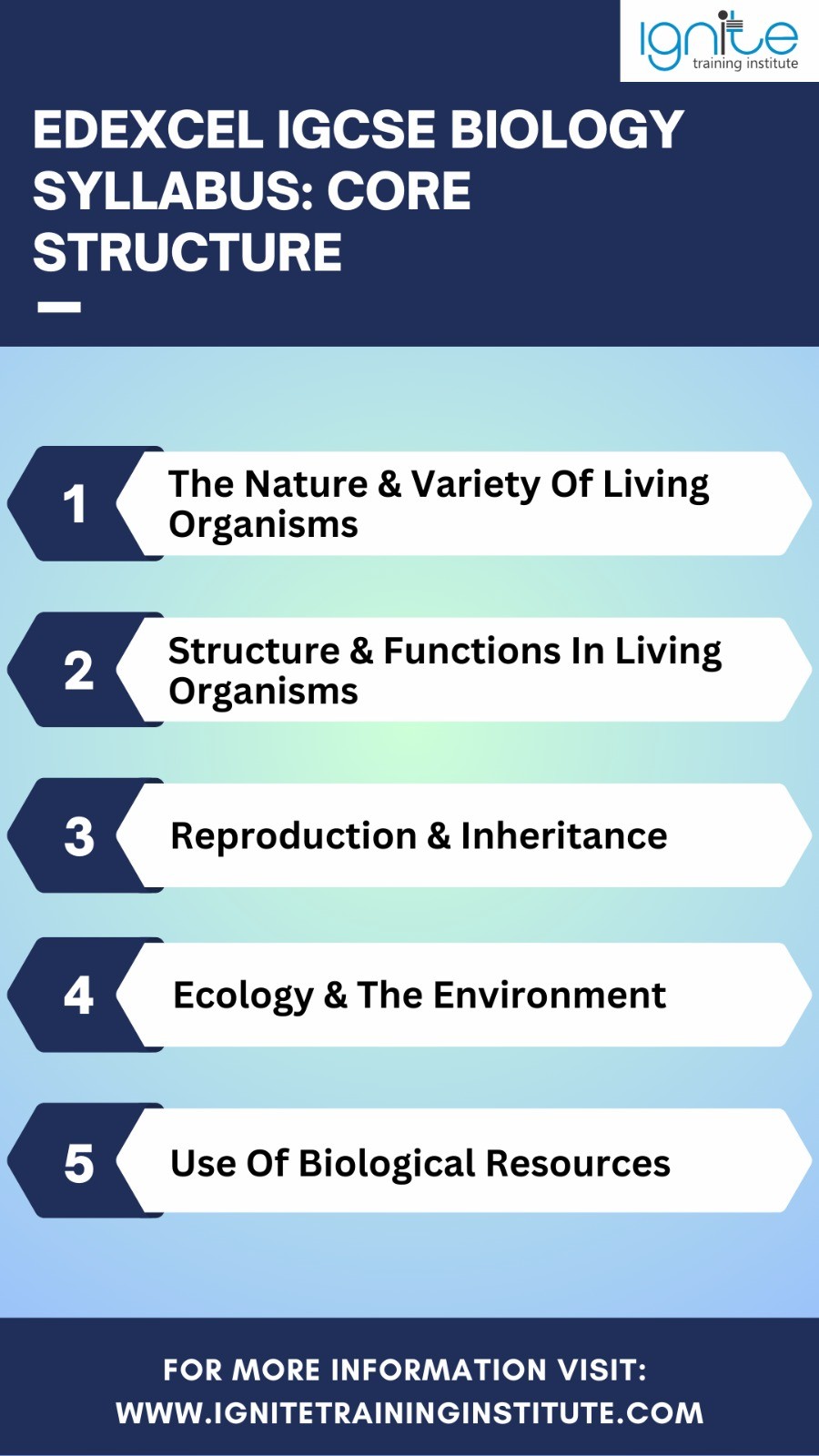In the vibrant world of science and discovery, understanding the intricate tapestry of life on Earth is an adventure that begins with the Edexcel IGCSE Biology Syllabus. Whether you’re a curious student embarking on your scientific journey or an educator seeking to unravel the wonders of the living world, this syllabus serves as your compass through the fascinating realm of biology.
Join us as we delve into the core principles, content areas, and assessment specifics that make up this enriching curriculum. From the structure and functions of living organisms to the marvels of ecology and the secrets of inheritance, this syllabus is your portal to exploring life’s most profound mysteries and uncovering the natural world’s wonders through exploration. Moreover, Ignite Training Institute offers full tutoring support for IGCSE Biology.
Why Choose Edexcel IGCSE Qualifications For Biology?
Edexcel’s academic credentials, under the umbrella of Pearson, represent a pivotal player in the UK’s education landscape, benefiting more than 3.4 million students across the globe.
These qualifications are not only well-respected internationally but also sought after by educational institutions and employers worldwide.
The global giant, Pearson, a powerhouse in education, dedicates its resources to empowering Edexcel’s students with the knowledge and skills required for their future journeys. Edexcel’s qualifications, known for their rigor, inclusivity, and transformative potential, align seamlessly with Pearson’s world-class benchmarks.
The collaborative efforts with education luminaries and assessment experts ensure that Edexcel qualifications remain at the pinnacle of global relevance and consistent excellence.
Related: Best Tutors In Dubai For IB, IGCSE, A-Levels, & AP
Edexcel IGCSE Biology Syllabus: Core Structure

The core structure of the Edexcel IGCSE Biology syllabus can be summarized into five key areas:
1. The Nature & Variety Of Living Organisms
This section delves into the rich tapestry of life on our planet. Students will explore the incredible diversity of living organisms, ranging from microorganisms to complex multicellular organisms.
They’ll learn about the principles of taxonomy and classification, understanding how scientists categorize and organize living things based on shared characteristics. This section may also cover topics like the basic needs of organisms, adaptation to the environment, and the impact of biodiversity on ecosystems.
2. Structure & Functions In Living Organisms
In this area, students will study the intricacies of biological structures and how they relate to their functions. This includes examining the structure of cells, tissues, organs, and organ systems in various organisms.
Topics such as cell biology, tissue organization, and organ systems (e.g., the respiratory system, circulatory system, and nervous system) will be explored. Understanding how structure and function are intimately linked is fundamental to comprehending how living organisms work.
3. Reproduction & Inheritance
This section is pivotal in understanding how genetic information is passed from one generation to the next. Students will learn about various modes of reproduction, both sexual and asexual, and the advantages and disadvantages of each.
Additionally, they’ll explore the principles of inheritance, genetic variation, and the mechanisms behind traits being passed on from parents to offspring. Key concepts like DNA structure, genes, alleles, and Punnett squares are typically covered in this area.
4. Ecology & The Environment
Ecology delves into the interactions between organisms and their surroundings. Students will gain insights into ecological concepts such as ecosystems, food chains, and the cycling of materials in the environment.
Conservation and the importance of preserving biodiversity will also be discussed, as well as the impacts of human activities on ecosystems, including climate change and pollution.
5. Use Of Biological Resources
This part of the syllabus explores how humans utilize biological resources for various purposes. Students will delve into topics like agriculture and food production, biotechnology, and the use of biological resources in medicine.
They may learn about genetic engineering, pharmaceuticals, and the sustainable use of resources to meet the needs of a growing global population.
Related: Best IGCSE Tutors In Dubai To Achieve Grade Excellence
Important Topics In Edexcel IGCSE Biology Syllabus
Edexcel IGCSE Biology is a comprehensive and challenging curriculum that covers a wide range of topics related to the biological sciences. It is designed to provide students with a strong foundation in biology, preparing them for further study and a deeper understanding of the subject. Here are some of the important topics in the Edexcel IGCSE Biology syllabus:
- Cell Biology: This topic covers the structure and function of cells, including cell organelles, cell division, and cell specialization. It is the foundation of all biological studies.
- Enzymes: Understanding enzymes is crucial in comprehending how biochemical reactions occur in living organisms. Students learn about factors that affect enzyme activity and their role in metabolic pathways.
- Plant & Animal Nutrition: This section focuses on the nutrients required by plants and animals, the process of photosynthesis, and the digestive system in humans.
- Transport In Plants & Animals: Students learn about the transport of water and nutrients in plants through the xylem and phloem, as well as the circulatory system in animals.
- Respiration: This topic explores the process of respiration in both plants and animals, emphasizing the importance of oxygen in energy production.
- Coordination & Response: Understanding how organisms sense and respond to their environment is vital. This includes the nervous system, hormones, and their impact on bodily functions.
- Reproduction: The syllabus covers both asexual and sexual reproduction in plants and animals, including human reproductive systems and contraception.
- Inheritance: Students learn about genetics, inheritance patterns, genetic disorders, and genetic engineering.
- Ecology: This section covers ecosystems, food chains, biodiversity, and human impact on the environment. It’s an essential part of understanding the relationships between organisms and their surroundings.
- Variation & Selection: The study of evolution, natural selection, and adaptation in different species, including the principles of the theory of evolution by Charles Darwin.
- Biotechnology & Genetic Engineering: This topic delves into the applications of biotechnology, such as genetic modification, and cloning, and their ethical considerations.
- Human Impact On The Environment: Students explore the environmental issues caused by human activities, including pollution, deforestation, and climate change.
- Immunity: Understanding the immune system and how it defends the body against diseases is a critical component of the syllabus.
- Biotechnology & Genetic Engineering: The applications of biotechnology in fields like medicine, agriculture, and forensics, including genetic modification and cloning.
- Microorganisms & Disease: The study of different pathogens, how they cause diseases, and the body’s defense mechanisms against them.
- Biodiversity & Conservation: An examination of the importance of preserving biodiversity and the methods used to conserve endangered species and ecosystems.
These are some of the key topics within the Edexcel IGCSE Biology syllabus. Mastering these concepts will not only help students excel in their exams but also lay the groundwork for further studies in biology and related fields.
Related: 10 Easiest IGCSE Subjects In 2023 For Academic Excellence
Edexcel IGCSE Biology Exam Format
The Edexcel IGCSE Biology exam format typically consists of two exam papers: Paper 1 and Paper 2. Here’s an overview of the format for each paper:
Paper 1: This is the multiple-choice paper, which assesses your knowledge and understanding of the subject. It consists of 45 multiple-choice questions covering the entire syllabus. This document spans 75 minutes in length.
Paper 2: This paper assesses your understanding of more complex concepts and principles. It includes a mix of structured and extended questions. The paper is divided into three sections: Section A (Core content), Section B (Additional content), and Section C (Extension content). It is 1 hour and 45 minutes long.
The Edexcel IGCSE Biology exam format may vary slightly from year to year, so it’s essential to check the specific details and any updates provided by the exam board before your exam.
Related: Top Universities That Accept IGCSE Certificates in USA & UK
Information About Edexcel IGCSE Biology Paper 1
Edexcel IGCSE Biology Paper 1 is a fundamental examination in the Edexcel International General Certificate of Secondary Education (IGCSE) Biology course. This paper evaluates students’ foundational knowledge of biology, covering key concepts and principles, and serves as a crucial stepping stone in their biology education.
Edexcel IGCSE Biology Paper 1 Overview:
- Examination Dates: Available for examination in both January and June.
- Debut Assessment: First introduced as an assessment in June 2019.
Examination Specifics:
- Content Focus: Primarily assesses core content, excluding bold topics and those with a ‘B’ reference. Questions span across five central content categories.
- Content Categories: Encompass the nature and diversity of living organisms, structures, and functions in organisms, mechanisms of reproduction and inheritance, ecological concepts, and utilization of biological resources.
- Examination Details: A 2-hour written examination, externally set and marked by Pearson.
- Total Marks: Worth a total of 110 marks.
- Question Styles: Features a diverse range of question styles, including multiple-choice, short-answer, mathematical calculations, and extended open-response questions.
- Calculator Use: A calculator is allowed during the examination.
Related: 10 Proven Strategies On How To Study For IGCSE Exams & Excel
Information About Edexcel IGCSE Biology Paper 2
Edexcel IGCSE Biology Paper 2 is a critical component of the Edexcel International General Certificate of Secondary Education (IGCSE) Biology curriculum. This paper assesses students’ knowledge and understanding of biology through a series of structured questions, providing a comprehensive evaluation of their biological skills and concepts.
Edexcel IGCSE Biology Paper 2 Overview:
- External Evaluation: This paper is subject to external assessment by the examination board.
- Examination Availability: It is accessible for examination in both January and June.
- Inaugural Evaluation: Edexcel IGCSE Biology Paper 2 was first introduced as an assessed component in June 2019.
Content Coverage Summary:
- Comprehensive Assessment: This paper scrutinizes all the content within the IGCSE Biology syllabus, encompassing topics both in bold and with a ‘B’ reference.
- Content Versatility: Questions can originate from any area within the IGCSE Biology specification, providing a thorough evaluation of the student’s knowledge.
- Emphasis on Bold Statements: Bold statements highlight sub-topics that receive more in-depth examination.
Examination Specifics:
- Assessment Medium: The paper is evaluated through a 1-hour and 15-minute written examination, devised and assessed by Pearson, the examination board.
- Total Marks Allocation: This paper is allocated a total of 70 marks.
- Diverse Question Styles: It features a diverse array of question styles, including multiple-choice queries, short-answer questions, mathematical calculations, and extended open-response questions.
- Calculator Usage: Candidates are permitted to employ calculators during the examination to facilitate their responses.
Related: IGCSE Subjects Choices: Navigate Your Options For The Future
FAQs
1. Is Edexcel IGCSE biology hard?
The level of difficulty in Edexcel IGCSE Biology varies from student to student, but it is generally considered a challenging subject due to its comprehensive coverage of biological concepts and principles.
2. What Is The Highest Grade In Edexcel?
The highest grade in Edexcel is a Grade 9.
3. How Many Subjects Are There In Edexcel?
Edexcel offers a wide range of subjects, but the exact number can vary over time; as of my last knowledge update in September 2021, Edexcel offered examinations in over 40 subjects for IGCSE alone.
Conclusion

In conclusion, the Edexcel IGCSE Biology Syllabus opens the door to a world of wonder and understanding. It offers students a comprehensive and structured exploration of life’s fundamental principles, from the cellular intricacies to the grandeur of ecosystems. By mastering this syllabus, students not only gain valuable knowledge but also foster an enduring curiosity about the natural world.
It’s a foundation for future studies, a pathway to scientific inquiry, and a lens through which we can better comprehend the beauty and complexity of life on Earth. With the Edexcel IGCSE Biology Syllabus, students embark on a journey of lifelong learning and a deeper appreciation of the living world that surrounds us.
Related: IGCSE Subjects Choices: Navigate Your Options For The Future


